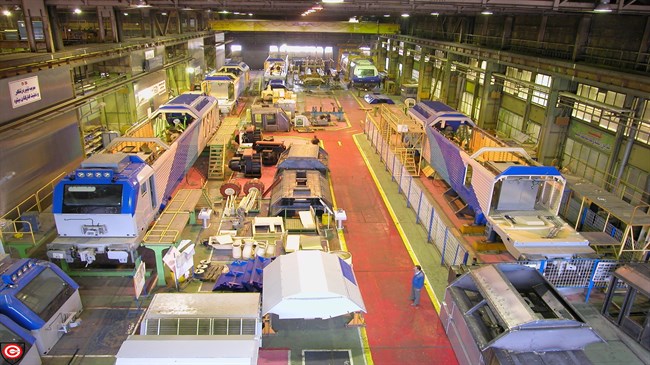Iran, France ink deal on manufacturing subway cars
High-ranking officials from Iran’s rail industry signed a major deal with the French rail car manufacturer Alstom to produce subway cars.
The agreement was signed in a ceremony in Tehran in which Iran’s Minister of Industry, Mines and Trade Mohammadreza Nematzadeh was also present, Tasnim News Agency reported.
Officials from Alstom — a multinational company operating worldwide in rail transport markets — the Industrial Development and Renovation Organization of Iran (IDRO) and Iranian Rail Industries Development Company (IRICO) inked the trilateral agreement.
Speaking at the ceremony, Nematzadeh pointed out that Iranian rail transport industry has had a minor share in the country’s development, and called for efforts to develop the industry.
He further pointed to the subway projects in seven metropolises nationwide, noting that manufacturing subway cars is one of the primary requirements for the projects.
Nematzadeh said a team of representatives from German engineering giant Siemens is scheduled to visit Tehran later this week for talks on investment and transfer of technology.
Deputy Head of IRICO Majid Talachian referred to the Alstom agreement and said that a similar deal will be signed with Siemens.
He said two other companies will be involved in cooperation with Siemens but he declined to give further details.
Siemens has perhaps been one of the most proactive German firms in pursuit of opportunities in Iran after January 2016 when Tehran and the world powers implemented a deal they had reached earlier to resolve a long-standing dispute over Iran’s nuclear program.
Siemens has been cooperating with Iran’s major industrial conglomerate MAPNA Group for years. It signed a contract with the Iranian giant in 2011 to supply 150 locomotives to the Islamic Republic of Iran Railways. MAPNA successfully acquired the technology and delivered the order in time.
Now the German company is expanding its presence in the Iranian market, which is in dire need of modern equipment as thousands of kilometers of new railroads, subways and electric and high-speed routes are being laid across the country.
Furthermore, MAPNA signed a preliminary deal in October 2016 with Siemens to manufacture 50 diesel electric locomotives for passenger trains. Another agreement was signed between MAPNA and Siemens last year for joint manufacture of 70 electric locomotives to be used in the 926-km Tehran-Mashhad railroad, which is being electrified.
The IRIR and Siemens’ transportation subsidiary Siemens Mobility signed several memoranda of understanding January last year to develop Iran’s railroads.
The agreements concern electrification of the Tehran-Mashhad railroad and Tehran-Isfahan high-speed train, supply of 500 wagons, development of Iran’s railroad infrastructure and provision of consultation and technology.
Should the new deal be signed, IDRO and IRICO will be added to the list of Siemens’ major Iranian partners.
The new deals are part of a plan, based on which IDRO is tasked to manufacture 2,000 passenger wagons to be used in the subways across Iran. The company was supposed to find partners through a tender.
IDRO’s Managing Director Mansour Moazzami said in the ceremony that Iran will need 8,000-10,000 wagons by the end of the Sixth Five-Year Development Plan (2017-22).
“But one of our problems is the inability to manufacture the wagons domestically, making use of our own financial resources, without access to latest modern technologies,” he said.
Iran has ramped up efforts to renovate its aging railroad industry by attracting foreign investment in light of the Joint Comprehensive Plan of Action (JCPOA), a nuclear agreement between Tehran and the P5+1 (Russia, China, the US, Britain, France and Germany) that went into effect in January 2016.
In April, Iran and Transmashholding, Russia’s largest company on the railway machine-building market, finalized a memorandum of understanding (MoU) to boost cooperation in production of railroad cars.
